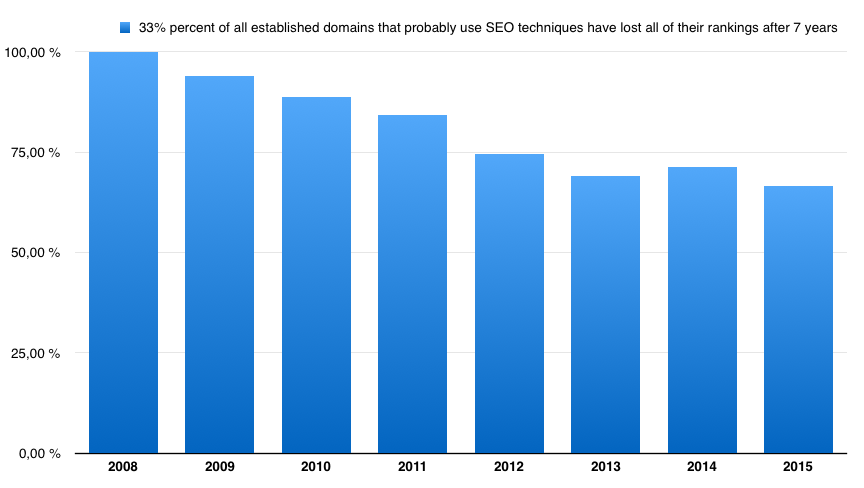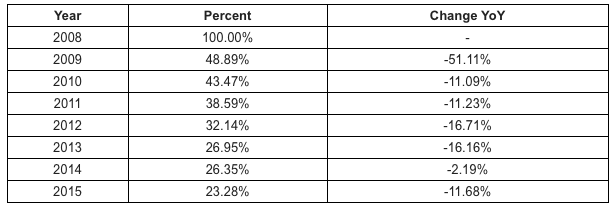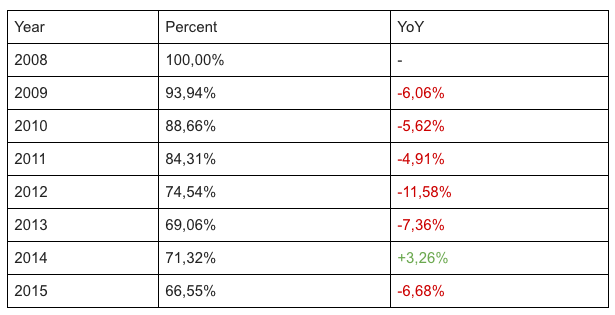A few months ago, we found this interesting blogpost “89% of Websites that Ranked 7 Years Ago are Not Ranking Now!“.
At first sight, 89 percent of all webpages losing all of their rankings after 7 years may look drastically high. On second thoughts, we believe this is due to the methodology being used for the study.
We used the same methodology with our own data to reproduce the study’s results and found 77 percent of websites losing all their rankings after 7 years. This value is not quite as high but leans in the same direction. What actually stands out is this: after one year about 50 percent of all domains have already lost all of their rankings. The following years this drop is far less pronounced.
Hold your horses!
For the sake of comparison we ran the same analysis for a shorter time frame of 4 years, starting with 2011, in order to see what would happen. Here, we see the same decline of about fifty percent (47%) of domains losing all rankings within one year, even though we started with a different year. This is due to a weakness in the methodology that was used in the evaluation.
The weakness is in the methodology
If you add all domains with at least one ranking within the Top 30 into one group, as was done in the initial study, you will have a large number of very “short lived” domains. These will be websites that were only in use for a very short time or were never seriously run. These may be websites for a spamproject, for example, a parked domain, a website someone set up for their kid’s birthday party, or a hobby project which was started but never continued.
These domains add a lot of “noise” to the evaluation. After one year, most of these websites will already have disappeared from the rankings again. It is important to note that this does not mean that these domains were penalised by Google.
Using another method
If you were to take only “established domains” into the evaluation, you would get a very different picture. For these domains, chance will not play a major role anymore and it would be considerably easier to make out certain developments in the time line:
(1) We decided to use domains which started with more than 100 keyword rankings on Google in 2008 because these are very likely serious projects, where you could expect to see an investment in SEO.
(2) It would also be highly likely that we would get another completely different picture if we looked past the Top 30 results and considered the Top 100 instead.
After 5 years, only a quarter of domains have “kicked the bucket” and 7 years after the starting date, about 2/3rds of the domains we started with are still around. Some websites die, some start over under a different name, some will catch a penalty or run into a Quality Update, get shut down or just die a natural death. But all in all, the rate at which domains disappear is not as alarming.

In 2013 we see a drop due to Google decreasing the domain diversity in Mid 2012 which rebounds in the 2014 data, once Google “improved” their domain diversity again. This was a big Update, but its biggest impact was only perceivable on positions 21-100. The domain diversity was reduced from 85 to 50 domains, on average, during that time.
One year later, Google “reimproved” the diversity again, this time from 50 to 96 domains, on average. Maybe the users wanted diversity and Google retracted (https://twitter.com/mattcutts/status/246713559080390656) their initial move.
With all this said, we fundamentally share Jim Boykins statement that key-values such as domain authority are not very meaningful anymore in times of many Google Updates. Even if the numbers are not as dramatic, it is highly likely that Google will not consider links from penalised domains much for their rankings.
We hope you enjoyed our post and wish you a successful day!



